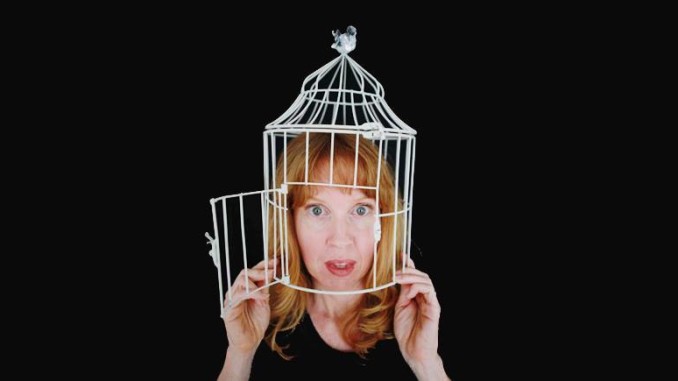
[Beige Comedy]
Described as a black comedy about mental health, Lisa Brickell’s Mockingbird investigates the effects of postnatal depression (or postpartem depression) on several generations of women, starting with the recently pregnant Tina all the way back to her grandmother. The central concern of the play, to advocate and educate in an entertaining fashion, is an admirable one, but the form, content and intentions don’t always line up.
Playing all the characters, including the men as well as the women, Brickell lends an enthusiastic energy to her performances, particularly with her physicality as she dances and twirls, juxtaposing wonderfully with the oppressive domesticity her characters endure. While the narrative occasionally alludes to wider issues such as nature versus nurture and the role of women in society, most of these ideas are merely brushed up against rather than addressed. Mockingbird is most concerned with the personal predicaments of these women and their motherhood anxieties, and presenting them in an accessible and playful manner.
Occasionally the tone of the play makes it difficult to know if the characters should be treated as realistic human beings or heightened caricatures, scenes shifting suddenly from drama to sitcom in a single beat. The men, in particular, are either jokes, plot devices or barely there.
It’s no surprise the characters and narrative aren’t as well developed as they could be when so many conventions and ideas are thrown into a mere hour. While Brickell’s miming and character changes work well with the bare set, which leaves our imaginations to fill the space, the clown and mask elements are less successful. Specifically, her Commedia dell’arte masked depiction of depression feels uncomfortably shoe-horned into the show, both introduced and resolved in a too offhand manner. The cartoonish tone of the performance comes off as confusing rather than comedic. As it is, the entire device could be removed without interfering with the play’s narrative, which makes you wonder why it’s necessary in the first place.
Musician Sarah Macombee’s presence, on the other hand, is well integrated into the structure, and her inappropriately upbeat songs capture the blackly comic potential of the show. Her music is a careful balancing between funny and depressing that turns the everyday horrors into the comically over the top. And while her occasional dialogue-based interjections and interactions with Brickell aren’t quite as successful, there’s still a sense of logic to their placement and purpose.
Unfortunately, the rest of the show is populated by jokes that have very little to do with the discomfort or truth of motherhood, relying instead on well-worn clichés (a character with a stereotypical Maori bro accent and recreational marijuana use, for example). In attempting to write a play about depression that isn’t depressing, Brickell ends up presenting an overly simplified and reductive take on the issue, and a black comedy that isn’t particularly dark. The ending, especially, feels pat and contrived to bring a smile on our faces without showing us a real journey.
The best storytelling acts as an empathy machine that audience members, no matter their background or histories, can connect with. While Mockingbird succeeds in bringing awareness to postnatal depression, it struggles to give us a deeper understanding of it and the people who suffer from it.
Mockingbird is presented by Funny Business and plays at The Basement until 8th October. Details see The Basement. Mockingbird also plays at Te Pou Theatre on 12th October.



Leave a Reply